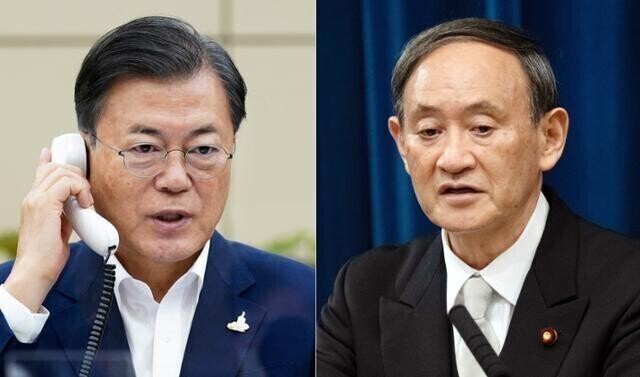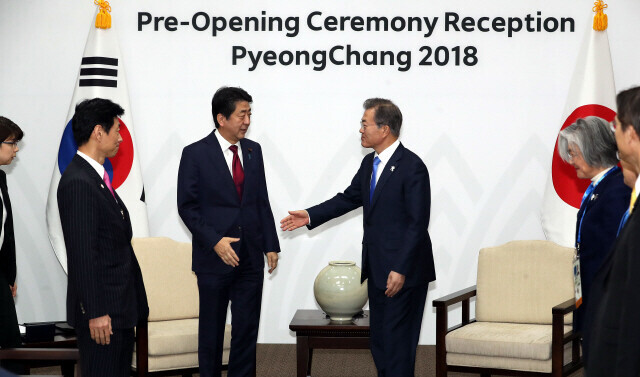hankyoreh
Links to other country sites 다른 나라 사이트 링크
Why are S. Korea, Japan touchy over how long potential Moon-Suga summit would be?

South Korean and Japanese diplomatic officials are in a tense tug-of-war over whether South Korean President Moon Jae-in will visit Japan for the opening ceremony of the Tokyo Summer Olympics on July 23.
On the surface, the two sides’ argument is about protocol. But behind the scenes, the real problem is their inability to bridge differences in their views on longstanding issues such as compensation to victims of forced labor mobilization.
Diplomatic officials on both sides have been holding behind-the-scenes talks to coordinate a visit by Moon for the Olympics opening ceremony after a “pull-aside” summit between him and Japanese Prime Minister Yoshihide Suga failed to come about during the G7 summit in England’s Cornwall region on June 12–13.
It was South Korea that was first to go on record about what had until then been top-secret discussions over the Japan visit.
In a Wednesday appearance on MBC radio, Senior Presidential Secretary for Public Affairs Park Soo-hyun said he wants to see “a South Korea-Japan summit that results in the conflicts between South Korea and Japan being resolved” if Moon does visit Japan.
In remarks the following day, Suga reiterated his demand for “an appropriate response from South Korea” on issues between the two sides, but also said he would “obviously respond courteously in diplomatic terms if [Moon] visits Japan.” His response effectively sealed the likelihood of a summit taking place between the two leaders.
No sooner was the decision made to go ahead with the summit than controversy erupted over the formalities.

On Sunday, the Kyodo News agency reported that Suga had decided in late June not to accord Moon any “special treatment,” as South Korea was showing an “uncompromising stance” on the issues of compensation for victims of wartime sexual enslavement by the Japanese military and forced labor mobilization.
A Prime Minister’s Official Residence official was quoted as saying that Suga’s meetings with heads of state would be restricted to “around 15 minutes [per leader] as a rule.” The remarks signaled that Suga intended to assign the Moon summit what amounted to a sideshow role.
The reason Tokyo went public with such provocative remarks was due to its failure to win a “satisfactory” answer in its behind-the-scenes negotiations on matters between the two sides, including court rulings concerning forced labor mobilization and military sexual slavery victims.
In response, South Korea launched a counteroffensive, with its Ministry of Foreign Affairs (MOFA) issuing a message Sunday expressing “deep dismay.”
“It is difficult for intergovernmental discussions to continue under these circumstances, and we urge Japan to respond prudently,” it said.
In its behind-the-scenes talks with Japan, the South Korean government reportedly called for a “withdrawal” of Japanese export controls imposed in July 2019, while advocating a stance of discussing historical matters “through dialogue among diplomatic authorities,” according to the MOFA’s position statement Sunday.
“The key things are the formalities [a summit lasting at least one hour] and results [the withdrawal of Japan’s export controls],” a senior South Korean administration official said.
“We’re going to watch how things develop rather than reacting any longer to Japan’s responses,” the official added.
Tokyo appeared to shrug its shoulders somewhat in response to Seoul’s plans for a sterner approach. In a regular press conference Monday, Japanese Chief Cabinet Secretary Katsunobu Kato said, “The government has not changed in its view that it is proper to respond courteously in diplomatic terms when a [foreign] president visits.”
If two sides fail to reach a consensus in their debate over whether the summit should last for 15 minutes or an hour, Moon’s Japan visit may not end up happening after all.
By Gil Yun-hyung, staff reporter
Please direct comments or questions to [english@hani.co.kr]

Editorial・opinion
![[Column] When ‘fairness’ means hate and violence [Column] When ‘fairness’ means hate and violence](https://flexible.img.hani.co.kr/flexible/normal/500/300/imgdb/original/2024/0516/7417158465908824.jpg) [Column] When ‘fairness’ means hate and violence
[Column] When ‘fairness’ means hate and violence![[Editorial] Yoon must stop abusing authority to shield himself from investigation [Editorial] Yoon must stop abusing authority to shield himself from investigation](https://flexible.img.hani.co.kr/flexible/normal/500/300/imgdb/original/2024/0516/4417158464854198.jpg) [Editorial] Yoon must stop abusing authority to shield himself from investigation
[Editorial] Yoon must stop abusing authority to shield himself from investigation- [Column] US troop withdrawal from Korea could be the Acheson Line all over
- [Column] How to win back readers who’ve turned to YouTube for news
- [Column] Welcome to the president’s pity party
- [Editorial] Korea must respond firmly to Japan’s attempt to usurp Line
- [Editorial] Transfers of prosecutors investigating Korea’s first lady send chilling message
- [Column] Will Seoul’s ties with Moscow really recover on their own?
- [Column] Samsung’s ‘lost decade’ and Lee Jae-yong’s mismatched chopsticks
- [Correspondent’s column] The real reason the US is worried about Chinese ‘overcapacity’
Most viewed articles
- 1China calls US tariffs ‘madness,’ warns of full-on trade conflict
- 2[Column] US troop withdrawal from Korea could be the Acheson Line all over
- 3[Editorial] Yoon must stop abusing authority to shield himself from investigation
- 4[Column] When ‘fairness’ means hate and violence
- 5[Column] How to win back readers who’ve turned to YouTube for news
- 6US has always pulled troops from Korea unilaterally — is Yoon prepared for it to happen again?
- 7[Book review] Who said Asians can’t make some good trouble?
- 8Naver’s union calls for action from government over possible Japanese buyout of Line
- 9Could Korea’s Naver lose control of Line to Japan?
- 10[Editorial] Korea must respond firmly to Japan’s attempt to usurp Line